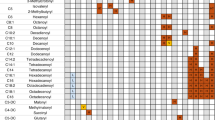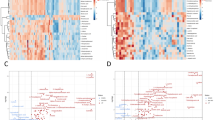Abstract
Measurement of free carnitine and acylcarnitines allows the detection of several inborn errors of metabolism in neonatal screening. Because available data for premature infants is limited, we studied longitudinal changes in acylcarnitine profiles of full-term and preterm neonates over the first 4 weeks of life. One hundred twenty infants were divided into four groups of 30: A, gestational age 22 to 27 wk; B, 28 to 31 wk; C, 32 to 36 wk; and D, 37 to 41 wk. Blood samples spotted on a Guthrie card were taken on days 5 and 28. Additional specimens (groups A and B only) were collected on days 1, 3, 7, and 14. Carnitine and its acyl esters were detected by looking for the precursor ions of m/z = 85 using a PE Sciex API 365 electrospray ionization tandem mass spectrometer. Concentrations of free carnitine and most acylcarnitines were significantly higher in group A compared with group D postnatally. Groups B and C displayed intermediate values. Carnitine levels in infants from group A and B decreased steadily from day 1 to day 7, and recovered up to day 14 in group B only. On day 28 carnitine concentrations had further decreased in group A, while reaching postnatal levels again in group B. Postnatal carnitine levels are higher in very immature preterm infants compared with full-term infants, but become lower on day 28. However, the commonly used metabolite ratios should still allow the detection of inborn errors of metabolism.
Similar content being viewed by others
Log in or create a free account to read this content
Gain free access to this article, as well as selected content from this journal and more on nature.com
or
Abbreviations
- MS/MS:
-
tandem mass spectrometry
- FC:
-
free carnitine
- TC:
-
total carnitine
- tAC:
-
total acylcarnitine
References
Chace DH, Hillman SL, van Hove JL, Naylor EW 1997 Rapid diagnosis of MCAD deficiency: quantitatively analysis of octanoylcarnitine other acylcarnitines in newborn blood spots by tandem mass spectrometry. Clin Chem 43: 2106–2113
Rashed MS, Ozand PT, Bucknall MP, Little D 1995 Diagnosis of inborn errors of metabolism from blood spots by acylcarnitines amino acids profiling using automated electrospray tandem mass spectrometry. Pediatr Res 38: 324–331
Schulze A, Kohlmüller D, Mayatepek E 1999 Sensitivity of electrospray-tandem mass spectro-metry using the phenylalanine/tyrosine-ratio for differential diagnosis of hyperphenylalaninemia in neonates. Clin Chim Acta 283: 15–20
Meyburg J, Schulze A, Kohlmüller D, Linderkamp O, Mayatepek E 2001 Postnatal changes in neonatal acylcarnitine profile. Pediatr Res 49: 125–129
Shenai JP, Borum PR, Mohan P, Donlevy SC 1983 Carnitine status at birth of newborn infants of varying gestation. Pediatr Res 17: 579–582
Schiff D, Chan G, Seccombe D, Hahn P 1979 Plasma carnitine levels during intravenous feeding of the neonate. J Pediatr 95: 1043–1046
Bonner CM, DeBrie KL, Hug G, Landrigan E, Taylor BJ 1995 Effects of parenteral L-carnitine supplementation on fat metabolism nutrition in premature neonates. J Pediatr 126: 287–292
Arbeitsgemeinschaft für Pädiatrische Stoffwechselstörungen (APS) der Deutschen Gesellschaft für Kinderheilkunde 1997 Richtlinien zur Organisation und Durchführung des Neugeborenen-Screenings auf angeborene Stoffwechselstörungen und Endokrinopathien in Deutschland. Der Frauenarzt 38: 1180–1184
Cederblad G, Svenningsen N 1986 Plasma carnitine breast milk carnitine intake in premature infants. J Pediatr Gastroenterol Nutr 5: 616–621
Mares-Perlman JA, Farrell PM, Gutcher GR 1986 Changes in erythrocyte plasma carnitine concentrations in preterm neonates. Am J Clin Nutr 43: 77–84
Melegh B, Szücs L, Kerner J, Sandor A 1988 Changes of plasma free amino acids renal clearances of carnitines in premature infants during L-carnitine-supplemented human milk feeding. J Pediatr Gastroenterol Nutr 7: 424–429
Melegh B, Kerner J, Sandor A, Vinceller M, Kispal G 1987 Effects of oral L-carnitine supplementation in low-birth-weight premature infants maintained on human milk. Biol Neonate 51: 185–193
Schmidt-Sommerfeld E, Penn D, Wolf H 1982 Carnitine blood concentrations fat utilization in parenterally alimented premature newborn infants. J Pediatr 100: 260–264
Yeh YY, Cooke RJ, Zee P 1985 Impairment of lipid emulsion metabolism associated with carnitine insufficiency in premature infants. J Pediatr Gastroenterol Nutr 4: 795–798
Shortland GJ, Walter JH, Stroud C, Fleming PJ, Speidel BD, Marlow N 1998 Randomised controlled trial of L-carnitine as a nutritional supplement in preterm infants. Arch Dis Child Fetal Neonatal Ed 78: F185–F188
Schmidt-Sommerfeld E, Penn D, Wolf H 1983 Carnitine deficiency in premature infants receiving total parenteral nutrition: effect of L-carnitine supplementation. J Pediatr 102: 931–935
Penn D, Schmidt-Sommerfeld E, Wolf H 1980 Carnitine deficiency in premature infants receiving total parenteral nutrition. Early Hum Dev 4: 23–34
Fishlock RC, Bieber LL, Snoswell AM 1984 Sources of error in determinations of carnitine acylcarnitine in plasma. Clin Chem 30: 316–318
Shenai JP, Borum PR 1984 Tissue carnitine reserves of newborn infants. Pediatr Res 18: 679–682
Penn D, Ludwigs B, Schmidt SE, Pascu F 1985 Effect of nutrition on tissue carnitine concentrations in infants of different gestational ages. Biol Neonate 47: 130–135
Penn D, Schmidt-Sommerfeld E, Pascu F 1981 Decreased tissue carnitine concentrations in newborn infants receiving total parenteral nutrition. J Pediatr 98: 976–978
Novak M, Monkus EF, Chung D, Buch M 1981 Carnitine in the perinatal metabolism of lipids. I. Relationship between maternal fetal plasma levels of carnitine acylcarnitines. Pediatrics 67: 95–100
Cederblad G, Niklasson A, Rydgren B, Albertsson-Wikland K, Olegard R 1985 Carnitine in maternal neonatal plasma. Acta Paediatr Scand 74: 500–504
Schmidt-Sommerfeld E, Penn D, Sodha RJ, Prögler M, Novak M, Schneider H 1985 Transfer metabolism of carnitine carnitine esters in the in vitro perfused human placenta. Pediatr Res 19: 700–706
Bernardini I, Evans MI, Nicolaides KH, Economides DL, Gahl WA 1991 The fetal concentrating index as a gestational age-independent measure of placental dysfunction in intrauterine growth retardation. Am J Obstet Gynecol 164: 1481–1487
Campoy C, Bayes R, Peinado JM, Rivero M, Lopez C, Molina-Font JA 1998 Evaluation of carnitine nutritional status in fullterm newborn infants. Early Human Dev 53( Suppl): S149–S164
Author information
Authors and Affiliations
Corresponding author
Rights and permissions
About this article
Cite this article
Meyburg, J., Schulze, A., Kohlmueller, D. et al. Acylcarnitine Profiles of Preterm Infants Over the First Four Weeks of Life. Pediatr Res 52, 720–723 (2002). https://doi.org/10.1203/00006450-200211000-00018
Received:
Accepted:
Issue date:
DOI: https://doi.org/10.1203/00006450-200211000-00018
This article is cited by
-
Instability of acylcarnitine and amino acids in dried blood spots preserved at various temperatures: the impact on retrospective analysis of inborn errors of metabolism biomarkers
Comparative Clinical Pathology (2024)
-
Carnitine longitudinal pattern in preterm infants <1800 g body weight: a case–control study
Pediatric Research (2019)
-
Analysis and interpretation of acylcarnitine profiles in dried blood spot and plasma of preterm and full-term newborns
Pediatric Research (2015)
-
Amino Acid and Acylcarnitine Profiles in Premature Neonates: A Pilot Study
The Indian Journal of Pediatrics (2013)
-
Newborn screening for methylmalonic acidurias—Optimization by statistical parameter combination
Journal of Inherited Metabolic Disease (2008)



